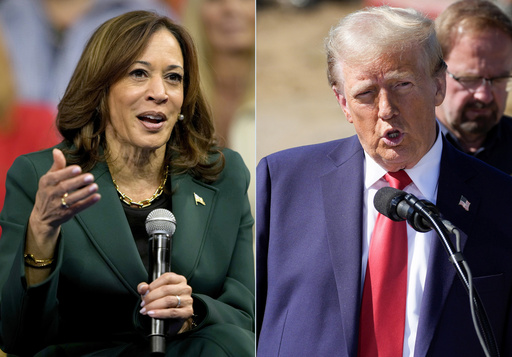**Political Landscape of the 2024 Presidential Election: Kamala Harris vs. Donald Trump**
In the lead-up to the presidential election on November 5, Kamala Harris appears to hold an advantageous position when it comes to issues surrounding abortion, climate change, and economic policies. Recent polling indicates that she is leading Republican contender Donald Trump on various significant topics. However, Harris understands that this race is exceedingly close and could serve as a litmus test regarding the importance of policy versus other voter considerations.
According to findings from a recent survey, Harris outpaces Trump on key issues such as abortion rights, election integrity, climate matters, tax policies aimed at the middle class, and disaster management. However, when it comes to specific economic issues—like job creation, grocery prices, and gasoline costs—Harris and Trump seem to be in a near tie. The two candidates are also nearly even on issues regarding crime and Middle Eastern affairs. Trump enjoys a slight edge over Harris in terms of trade tariffs and a more significant lead regarding immigration policies.
Despite Harris’ advantages in several crucial areas, her campaign is characterized by a degree of apprehension, given the historically close nature of the race. This situation underscores that while policy may play a vital role, it often competes with factors such as candidate personalities, party loyalty, and demographic influences that shape voter identities.
Polls suggest a shift in voter priorities compared to the last election cycle in 2020 when the COVID-19 pandemic dominated concerns. The data also indicate that the economy—once a strength for Trump—has become a battleground issue, especially as voters now view economic concerns as paramount. Harris’ campaign interprets their own polling data as a sign of competitiveness against Trump on the economic front, attributing it to her consistent focus on middle-class issues in her messaging.
“Harris significantly outperforms Trump regarding understanding the needs of working families,” stated a Harris campaign pollster. “When candidates focus intently on an issue, voters tend to feel they genuinely care about it.” Academic analysis has also emphasized the complexity of political leaning, noting that factors such as personality traits, political identification, and media consumption influence how voters digest policy-related information.
In the earlier rounds of the election cycle, Biden experienced challenges that reveal a disconnect between policy advantage and voter appeal. His campaign had shown him outperforming Trump in specific policy areas, yet he struggled with public perception concerning the economy and concerns about his age. The edge he had in policy did not translate to popularity.
Trump has positioned himself as a successful businessman and has attacked Harris on multiple fronts, including her previous stances when she served as San Francisco’s district attorney. He has made bold claims that her tenure negatively affected the city. While acknowledging economic issues like inflation, Trump often redirects attention to illegal immigration as his main concern. Polling data from October puts Trump ahead of Harris by significant margins on immigration—concepts that preoccupy GOP voters.
“Voters trust Trump to reinstate a robust economy due to his previous success as a businessman and president,” remarked Trump’s campaign spokesperson. He has criticized Harris on various issues, including her past calls to regulate fracking and her shifting views on immigration funding, alongside her support for transgender rights. Despite Harris making strides in certain areas, experts note that the negative attacks against her are beginning to resonate with undecided voters.
Political strategists have observed that Harris is increasingly focusing her campaign on Trump’s controversies rather than solely promoting her policy agenda. It appears she recognizes the potential advantage of critiquing Trump over merely discussing policy differences. This is evident when her campaign highlighted a letter from 23 Nobel economists endorsing her economic strategies as superior to Trump’s plans.
Additionally, campaign ads featuring voters who previously supported Trump but switched allegiance due to his perceived favoritism toward wealthy tax cuts are gaining traction. Harris’ proposals include significant down payment assistance for first-time buyers, tax breaks for families, new incentives to promote start-ups, and a push to increase registered apprenticeships—all funded by higher taxes on wealthier individuals and corporations.
“There are clear and stark contrasts between the candidates on essential issues,” noted an economist from the University of Chicago, highlighting how Harris’ policies could resonate significantly with voters.



